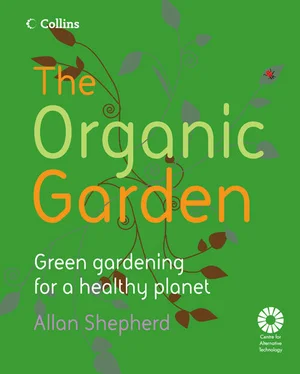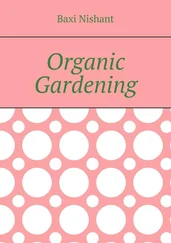As if this choice wasn’t enough, my friends take pity on my shade-dwelling self and offer me vegetables from their own sun-kissed plots (which is a bit of a laugh anyway, living in Wales as we do). These vegetables always taste the best, perhaps because they are usually cooked or eaten raw straight from the plot. Despite my best teenage intentions I seem to have landed in community-spirited gardening nirvana.
As the adverts say, it doesn’t stop there. We have a fantastically well-organised seed-swap group to keep favourite varieties of plants going, a wide selection of organic plots to visit and one of the UK’s oldest Soil Association-approved vegetable plots, run by Roger MacLennan at The Centre for Alternative Technology. We have people selling organic cut flowers, others growing more salad than you can shake a stick at. Every other person seems to be a gardener. Frankly I feel inadequate.
And everyone wants to give you something or offer you some advice. It’s as if organic gardeners in my area have gone through some sort of harmony realignment device and come out the other side wanting to help people. To be part of this community is uplifting and exciting.
But the truly amazing thing is that there’s nothing particularly unusual about our scene. Go to almost any area of the country (and world) and you will find something similar going on. Frankly, my teenage self would be horrified by this slow food revolution. And none of it franchised! Just ordinary people coming together to make food important again.
Every which way you care to look there’s some amazing activity going on in Britain: 300 organic box schemes, 250 farmers’ markets, 1,000 community gardens, 59 city farms, 75 school farms, 500,000 volunteer gardeners, thousands of organic allotmenteers…the list goes on.
St Ann’s Allotment Gardens in Nottingham, one of the biggest and oldest in the country, boasts a thriving list of community enterprises benefiting everyone from nursery-age children to the long-term unemployed. Ragman’s Lane farm in Gloucestershire has taught generation after generation of organic gardeners. Ludlow has declared itself a Cittàslow centre for good living, creating in the town an atmosphere conducive to appreciating quality over speed in all aspects of life. In Cornwall the real Eden project is going on at Ken Fern’s Plants for a Future in Lostwithiel. Here they’re testing a new system of horticulture called perennial edible or forest gardening that could help us to garden successfully in conditions of climate change. In Totnes Martin Crawford of the Agroforestry Research Trust is doing the same. In Kent Iain Tolhurst is developing new ways to garden without recourse to artificial or animal-related by-products. Coventry has the Heritage Seed Library and Garden Organic (HDRA); Bristol, The Soil Association and the ethical bank, Triodos; London, Fresh and Wild organic food shops; Keighley, The Ecology Building Society. Every part of Britain has an emerging network of community-inspired organic businesses and volunteer organisations.
Why is all this happening? I think it’s because people have rediscovered what it’s like to be part of something. Whether it’s a community or a local group or a movement. It’s fun and it feels like you’re doing something vitally important. It’s bringing people together to combat loss of biodiversity, social injustice and, the biggest threat to our culture, global climate change.
If I was abducted by aliens, it happened metaphorically, one night in 1991 – the first time I visited The Centre for Alternative Technology, or CAT as it is generally known. In those days you arrived at CAT via a ten-minute walk up an unlit, unpaved driveway shaded by trees. I climbed the path with fifteen friends from Hull University (we were all volunteering for the weekend). When we emerged from the trees at the top of the drive we entered a starlit courtyard of stone buildings. It was the first time starlight took my breath away.
A small handmade wooden sign directed us to our billet for the weekend – an unpretentious little wooden hut I later found out was a reclaimed exhibit from the 1976 Ideal Home Show. It was called Tea Chest. There was no one around. It was like a fairytale house. I half expected a little hobgoblin to come out shaking a stick at me. We opened the door and right in front of us laid out on an old wooden table was a beautiful homemade cake with a little note attached to it. The note said: ‘Help yourself.’ Some people say how notes like ‘I love you’ or ‘Will you marry me?’ changed their lives. For me it was ‘Help yourself’. With those two little words I was hooked. If this was organic living, count me in.
Visiting CAT for the first time was like pushing back the coats at the back of the wardrobe and stepping into Narnia.
Visiting CAT for the first time was like pushing back the coats at the back of the wardrobe and stepping into Narnia. I couldn’t believe such a place existed. Here were people who acted on their beliefs, not in a highminded fashion, but in a very practical down-to-earth way. They would show the world it was possible and preferable to live an organic lifestyle by doing it. By building houses with wood instead of concrete, by generating their own power using renewable energy, by growing their own organic food. Even by baking homemade cakes for complete strangers. Luxury items might have been scarce but they had plenty of passion and nerve. And they had community.
Through 70s’ recession and 80s’ economic miracle, the workers at CAT just carried on ploughing their own furrow. Showing that you didn’t have to buy in to what the rest of the world had to offer. You could do something different. They weren’t the only people to go against the prevailing wisdom. In the late 60s and early 70s organisations that have become household names were started in cramped offices all over Britain: Greenpeace, Friends of the Earth, The Soil Association, The Henry Doubleday Research Association (now Garden Organic).
But CAT has always been a little bit different. Out on a limb in Wales, hidden from view almost, it had the opportunity to test the alternatives without anyone really noticing. At least that was the intention. But even by 1976, within the first two years of its existence CAT attracted visitors. A trickle at first, then a steady stream of curious people, all wanting to know what was going on at the disused quarry in Machynlleth. Even TV execs became interested. They dispatched Blue Peter presenters and the Why Don’t You? team to find out what you could do if you switched off your television set and did something less boring instead. Royalty came. First Prince Philip and then his son Charles. All the time CAT, or The Quarry as it became known, carried on doing what its founder Gerard Morgan Grenville set out to do – show that alternatives were not only possible but preferable.
And now the alternatives have come of age. The Soil Association represents the fastest-growing agricultural sector in Britain. Greenpeace and Friends of the Earth feature in just about every news broadcast. Garden Organic (HDRA) has the support of our leading garden horticulturalists. And CAT helps hundreds of thousands of people every year find practical, positive solutions to environmental problems.
The non-organic world is a place I will not go back to. Despite the CS Lewis analogy, I think the organic world is the more real. It is why I live.
When I was seventeen my A-level history teacher told me of a book that started ‘come with me as we rush headlong towards the conclusion’. I can’t remember the title of the book but the quote obviously made an impression on me because it’s stuck in my head for nineteen years. I can’t promise such a breathless experience as that, Mrs Hedley, if you’re reading this, but I can say that this gardening book is unique.
Читать дальше












